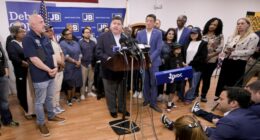A leading health organisation is pushing the federal government to make the $300 RSV vaccine free for thousands of vulnerable Australians as case numbers for the highly-contagious virus climb across the country.
The latest figures show nearly 120,000 cases of respiratory syncytial virus Australia-wide so far this year.
The symptoms can be severe, according to Mater director of infectious diseases Professor Paul Griffin, with the virus landing some older adults in hospitals.

“Unfortunately a proportion of them don’t survive,” Griffin said.
Anne Fidler, who picked the virus up from her granddaughter, had to manage several symptoms.
“I had headaches, I had a wheezing in my chest, a bit of a runny nose,” Fiddler said.
Fidler deteriorated quickly due to an existing lung condition and had to seek specialist support.
“Trying to get breath into my lungs, which was the hard part, that I thought this is not normal,” Fidler said.
Across Australia, a free RSV vaccination is available for pregnant women that will protect newborn babies, who can also receive an immunisation product if their mothers haven’t had the vaccine.
For anyone else, a vaccine costs around $300.
“The vaccine works tremendously well reducing the consequences of RSV infection in older adults and particularly those who are most vulnerable,” Griffin said.
“There are lots of groups that would really like to see this vaccine funded.”
This includes the Lung Foundation whose members are having to pay for protection.
“We encourage the Australian government to add the RSV vaccination to the national immunisation program for those that it is clinically recommended,” Lung Foundation CEO Mark Brooke said.
There are three RSV vaccines currently approved for Australians 60 years and over, but in order to be placed on the free National Immunisation Program they need to be considered by the Pharmaceutical Benefits Advisory Committee.
The committee has recommended public funding for Pfizer’s vaccine for people 75 and older, plus eligible Aboriginal and Torres Straight Islander adults, but it has not been listed yet due to concerns over cost-effectiveness.
The company said it was actively working with the Department of Health.
Two other companies GlaxoSmithKline and Moderna have confirmed they have lodged funding submissions to the committee.
In the meantime, vulnerable Australians are being urged to take care.
“Wearing a mask, or staying away from your family members when they are unwell, are all little precautions that we can take that go a long way to keeping you safe,” Brooke said.








